3 Common Teacher Interview Questions (With Tips and Example Answers)

It doesn’t matter if you’re just graduating, or if you’ve been teaching for 25 years – teacher interview questions can add SO much anxiety to your life. The process of being asked questions knowing that your job hangs in the balance can be exhausting, and unnerving.
I still remember my first teacher interview. The 1 hour interview felt like it lasted an entire day. As soon as the principal asked the question I had a million thoughts running through my head. “What if I say the wrong thing?” “I meant to add something to my last answer”. “Can I go back to that question?” And then while I was processing the millions of thoughts I couldn’t even focus on the next question being asked.
Interviews can be hard. But they don’t have to be! Like anything in life, your anxiety decreases as your preparation increases!
Let me help you by giving you 5 teacher interview questions along with tips on how to answer each one. Practice may not make the interview go perfect, but it will definitely calm your nerves so that you can represent the great teacher that you are!
Teacher Interview Question #1: “Tell Me About Yourself”
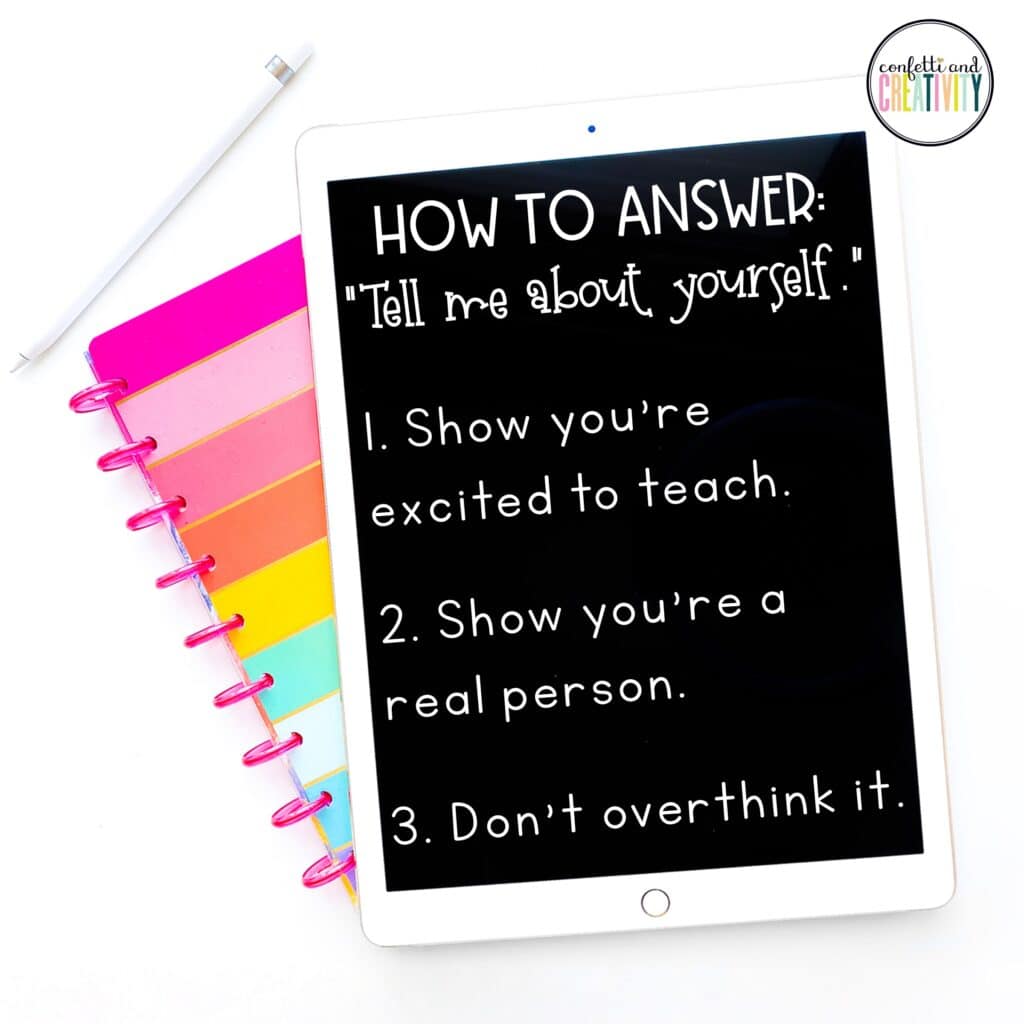
This is the most common question to start off an interview because it’s a great way to break the ice, and it’s a great way to get the conversation started. You’ll want to make sure that you have a good answer to this question so that you can start off strong and give yourself confidence!
Tip 1: Show that you’re excited to teach. You’re sitting in the room with your potential future boss. Every principal wants teachers that don’t just view it as a job, but something they’re passionate about. Don’t go over the top, but ending your answer with something like “I’m so excited to teach and make a difference” demonstrates that you viewing teaching as a core part of who you are.
Tip 2: Show that you’re a real person. A principal knows that the teachers who last have lives outside of school. Think about sharing a life giving hobby you have. You’ll naturally light up as you talk about something you love. Who knows, someone in the room might have a similar interests which breaks the tension and helps you relate right off the bat.
Tip 3: Don’t over think it. This question is asking for a quick overview of who you are as a person and as a teacher. Don’t feel like you need to give your whole autobiography, and know that whether or not your hired does NOT hinge on this question. Practice your answer once or twice so you can start off strong, and move on
Example Answer
“My name is Megan and I just recently graduated from the University of Central Florida where I loved playing intramural sports, and being a part of a campus ministry. I still love being active on the weekends by hiking with my husband and our 1 year old daughter. I graduated with a B.S. in elementary education because I’ve dreamed about being a teacher since middle school, and I can’t wait for the opportunity to teach and make a difference in the life of my students!”
Teacher Interview Question #2: “Why Did You Decide to become a teacher?”
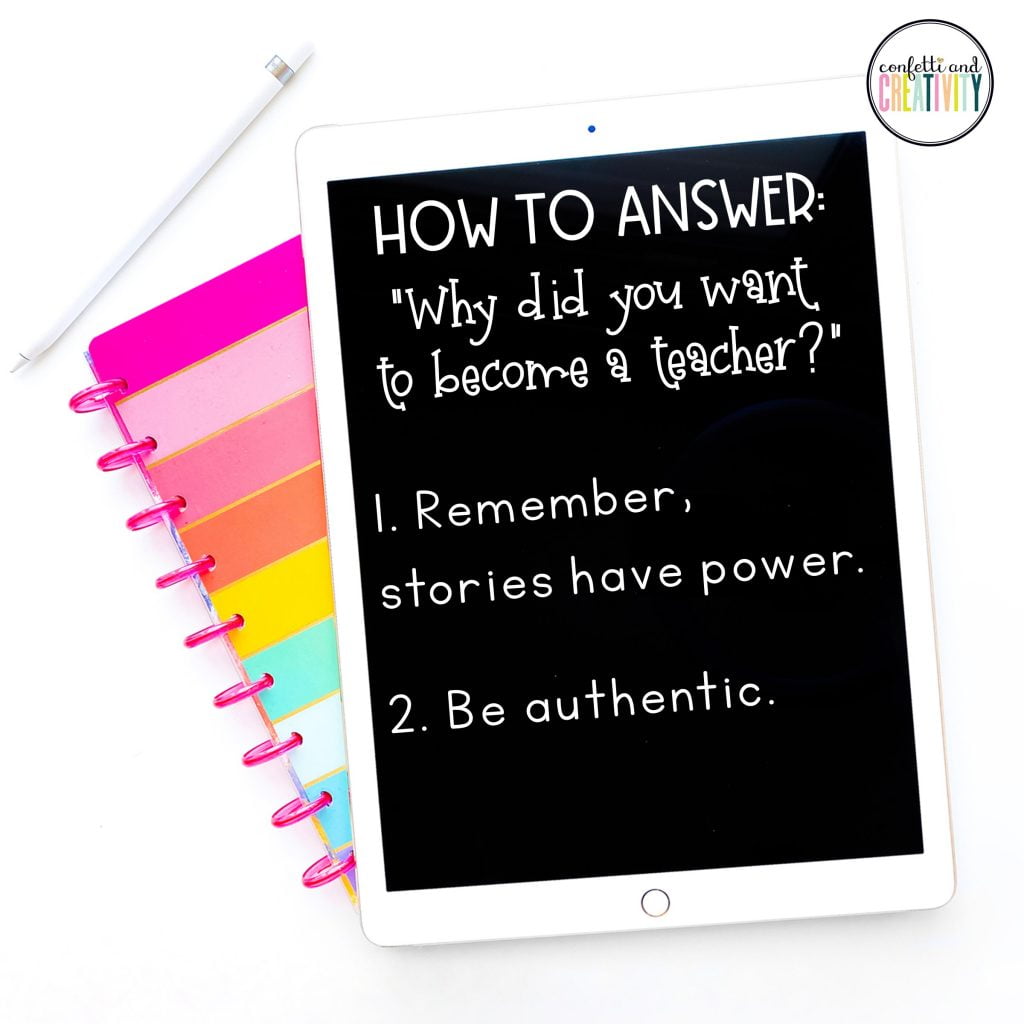
An administrator may ask this question to hear a little bit about your heart. Why do you love teaching? What do you hope to accomplish as a teacher? Is this just a job, or is this a passion of yours?
Tip #1: Stories have power. When answering any teacher interview question, it’s important to remember that a lot of what you say will be forgotten. However stories always stick. This is true for any lecture, sermon, or conversation you ever have – stories stick!
Think through your past – is there a teacher you had that made an impact? Did you always “play school” with your siblings? Do you have a relative who is a teacher and had a major impact on your life? Telling a story that connects will make you memorable and put you near the top of the list.
Tip #2: Be authentic. Don’t ever try to give an insincere answer because it will be evident and will shift the entire interview. You don’t need to pretend to be someone that you’re not, and you don’t need to compare yourself to others. You got the interview because they want to get to know you!
Example Answer
“That’s a great question! My third grade teacher Mrs. Williams was one of those teachers who made every lesson come alive. She did such a good job of caring for us and teaching us to care for each other. I was too young realize it at the time, but as I kept getting older I realized more and more how special that year was. I don’t think I ever felt such a warm classroom environment.
I don’t think I remember any of her specific lessons, but I remember the way she made all of us feel about learning and the way that she showed us she really cared for us. In middle school I remember thinking about Mrs. Williams and realizing that’s what I want to devote the rest of my life to. I want to provide a safe environment where learning becomes fun, and the class becomes a family. I’ll never forget Mrs. Williams, and I would love to be someone else’s Mrs. Williams.
Teacher Interview Question #3: “How Would You Handle a Consistently Disruptive Student?”
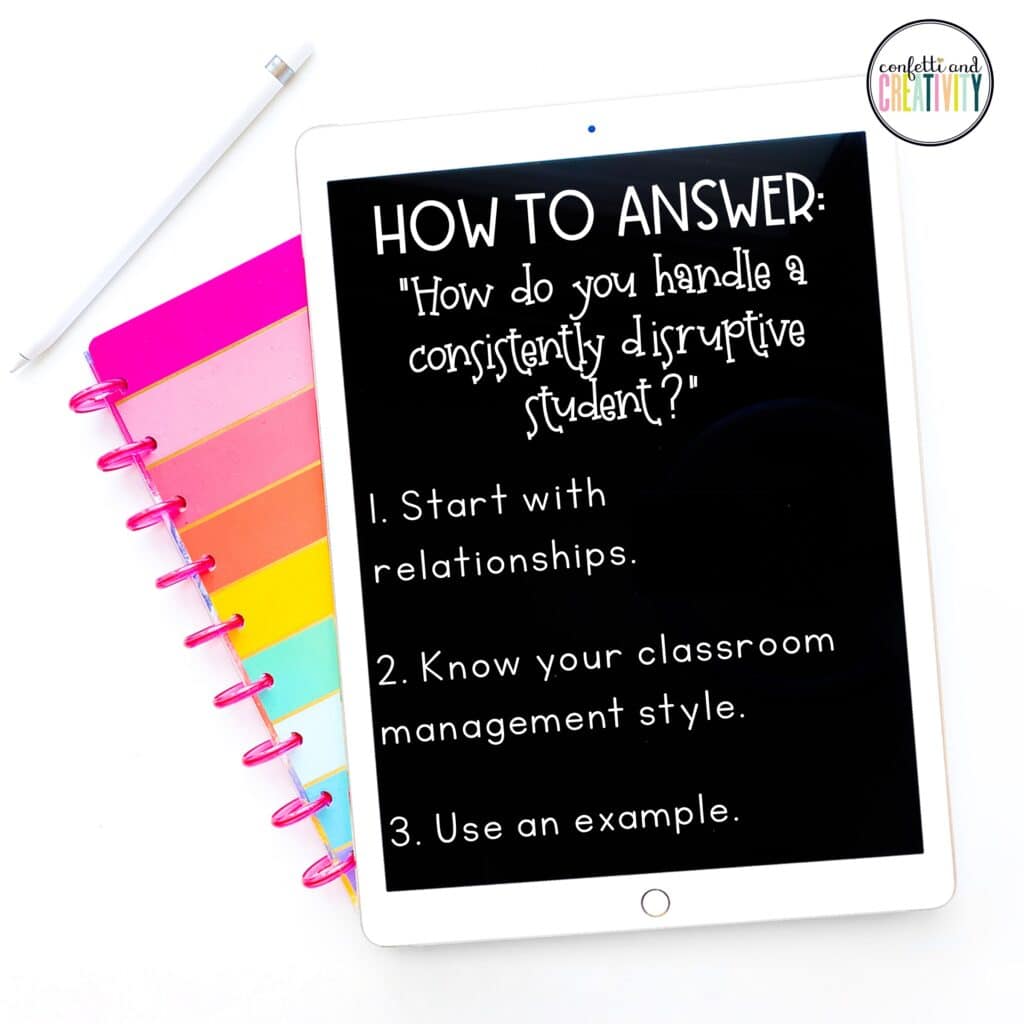
You can definitely expect this question at some point in your interview! An administrator wants to know that if they give you a classroom that you have classroom management skills.
Tip #1: Start with Relationship. All classroom management comes down to relationship. Think through things you could do to reach the student on a relationship level. Think through steps you could take to figure out the root issue of the student’s disruptiveness.
Maybe you could call home and see if there are any major changes in the student’s life. Maybe you could hold the student back after class to talk. You wouldn’t believe how many I’ve had students act out just because they didn’t feel seen or heard in other areas of their life.
Tip #2: Know Your Classroom Management Style. Spend some time before you enter interview season and think through your classroom procedures. What escalation steps would you use if you can’t reach a student.
Classroom management is a product of your personality and your teaching style. There’s not one correct answer, so don’t start thinking about how someone else might handle it. Because teaching is relationship based, your classroom management style needs to be personalized so that you can authentically carry it out.
Tip #3: Use an Example. Think of a situation in which you’ve reached a kid that was a challenge. Explain how you reached him, and highlight the relationship that you had as a basis of helping the student. Highlighting your action steps gives a lot of power to demonstrating that you’re not just quoting a college textbook- you have experience and won’t be caught of guard when this happens in your own classroom!
Example Answer
In my experience, students who are acting out are acting out because they’re hurting in another area of their life. There might be something going on at home, they might be struggling academic, or they might be have been hurt by someone in the class.
If their acting out has become a pattern, I would take my next opportunity to pull them aside and see if I can get to the root cause of their behavior. Once I can determine the root cause, I’d want to make a plan to help them make improvements and reinforce that I care for them and am on their side.
For example, last year I had a student named Jackson whose mother worked multiple jobs to make ends meet. Even though Jackson was in first grade, he spent a lot of time without an engaged authority figure. In Kindergarten, he began acting out just to get attention – even if it was negative attention. He continuously found himself in trouble, and he felt like teachers only discipline him.
After a couple of conversations it became apparent that he didn’t trust authority figures, and he just wanted to be heard. It wasn’t overnight, but through consistent and fair discipline paired with after school conversations, Jackson began slowly trusting me more and more.
He realized that I was on his side, and by the middle of the year he was a totally different student. Not because I tried discipline that his kindergarten hadn’t tried, but because I was able to build a relationship and listen to what was going on in his heart.
Conclusion

Well teacher friend, there you have it – 3 common teacher interview questions with example answers. I hope you found these tips helpful, and that you feel at least a little more prepared! If you’re struggling to even get an interview you might need a resume upgrade! Check out my teacher resumes for a sleek and beautiful resume that will put your resume at the top of the stack!
Let me know in the comments below – what teacher interview question(s) do you struggle with?

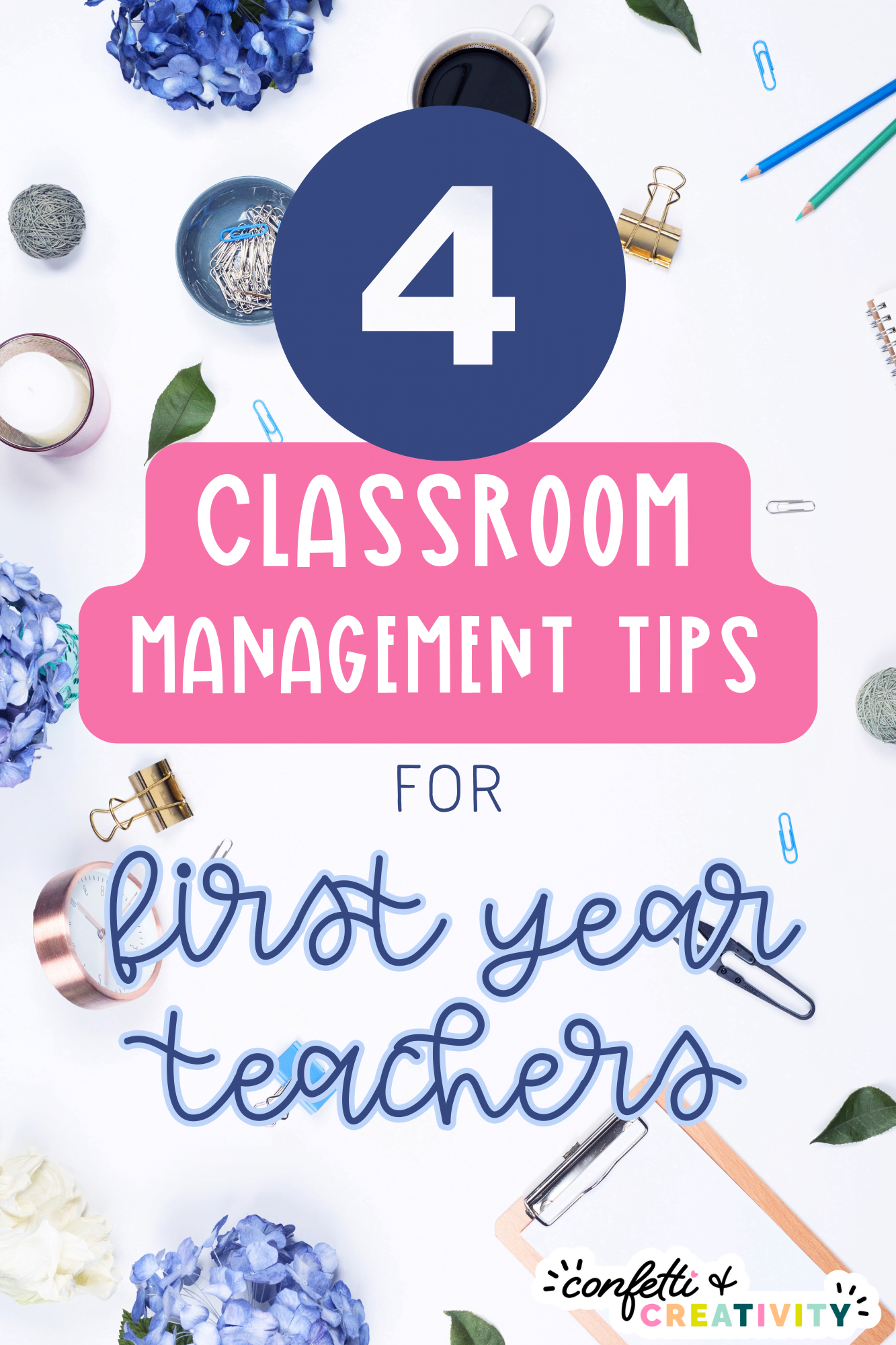
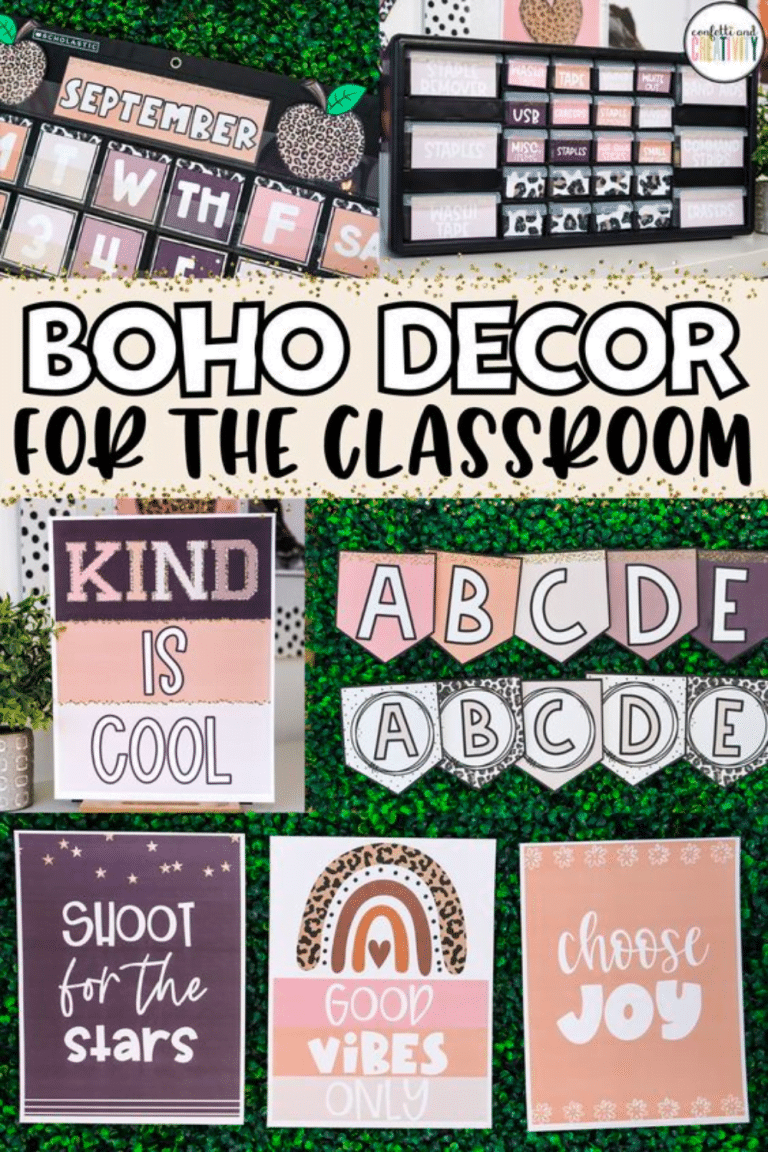









Get ALL the Freebies.
Sign up to get access to exclusive freebies for your classroom. New items added all the time!
I already have the password.